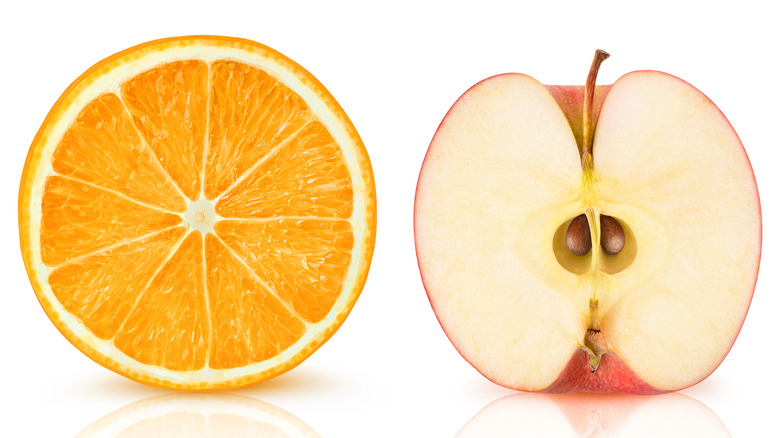Apples Versus Oranges: Which One Is Healthier?
If you're trying to develop a healthy diet, you won't do well without fruit. Aside from satisfying your cravings for sweetness without resorting to unhealthy food, fruits also offer many vitamins, minerals, and antioxidants that promote health in a variety of ways (via Advances in Nutrition). The Harvard T.H. Chan School of Public Health notes that eating enough fruit can reduce your risk of hypertension and heart disease, promote weight loss, and improve gastrointestinal and eye health.
Unfortunately, only around 12% of American adults actually eat enough fruit, according to the Centers for Disease Control and Prevention (CDC). When it comes to the fruits we do eat, the United States Department of Agriculture (USDA) lists apples and oranges as our favorites. Many people say you can't compare apples and oranges, but this isn't exactly true. Let's explore how America's favorite fruits compare in terms of the nutritional value they offer.
Apples and oranges offer different health benefits
We've all heard that "an apple a day keeps the doctor away," but would this saying be equally or even better suited for oranges? According to LiveStrong, oranges contain much more vitamin C, vitamin A, folic acid, and calcium. With all of this nutritional value in mind, it's no surprise that oranges and other citrus fruits are among the most beneficial when it comes to reducing a person's risk of death and chronic diseases, per the Harvard T. H. Chan School of Public Health.
However, Harvard is quick to warn against relying on just one fruit, as variety and quantity are equally important. No single fruit can cover all of your health needs. Apples offer more fiber, vitamin K, and manganese, and quercetin (via Prevention), and according to Harvard, may prove more beneficial when it comes to weight loss and preventing type 2 diabetes.
So, which fruit is healthier? You can draw your own conclusions based on your personal priorities. What is certain, though, is that both offer unique health benefits — and adding both to your diet will be healthier than adding one or neither.


